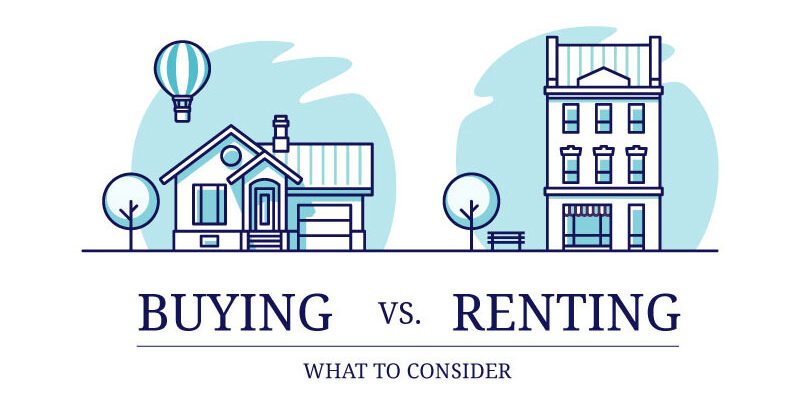Pros and Cons of Renting vs. Buying a Home: Making an Informed Decision
For many people, deciding whether to rent or buy a home is one of the biggest financial decisions they will make. There are compelling arguments on both sides of the rent versus buy debate. Carefully weighing the pros and cons of renting and buying can help you make the best choice for your needs and goals.
This comprehensive guide examines the key factors to consider when deciding between renting and owning property.
Flexibility and Mobility
One of the biggest advantages of renting is the freedom and flexibility it offers. As a renter, it’s relatively easy to relocate if your job or life circumstances change. You can typically move out after your lease is up without having to worry about selling a property. Renting also allows you to live in different neighborhoods or cities more easily. If you value mobility and adaptability, renting may be the better option for you.
Lower Upfront Costs
For many renters, the lower upfront costs are a major benefit. Renters typically only need to pay the first month’s rent and a security deposit when moving into a new place. Buyers, on the other hand, must come up with a down payment of 10-20% of the purchase price. Closing costs like inspections, appraisals, and loan origination fees can add thousands more at closing. For those lacking in savings, buying a home may not be feasible. Renting can be a more accessible option.
Predictable Housing Expenses
Unlike homeowners, renters enjoy predictable housing costs from month to month. Mortgage payments, property taxes, HOA fees and maintenance costs can fluctuate for buyers. Rent increases are typically small and annual. With a fixed monthly rent, it’s easier to budget and manage your housing expenses when renting. However, rents have been rising substantially in many markets, reducing cost predictability.
Customizing Your Living Space
One of the best aspects of home ownership is the freedom to customize your living space. Buyers can remodel, knock down walls, paint, landscape and generally make their home their own without restrictions. As an owner, you can add unique touches that reflect your personality and tastes. Renters generally need permission to make even minor alterations. If creating your dream home is a priority, buying may be for you.
Building Home Equity
A major benefit of buying your home is the ability to build home equity over time as you pay down your mortgage principal. You also benefit from any appreciation in the property’s value. As the owner, you will get back much or all of what you put into your home when you eventually sell. As a renter, your monthly payments go solely toward housing with no chance to build long term equity and wealth.
Potential Forced Moves
One key downside of renting is the possibility of being forced to move on short notice if the owner sells the property or stops renting it out. While buyers choose when and if to move, renters can be subject to forces out of their control. Month-to-month leases offer the least amount of protection. If not having to abruptly relocate is important, buying can provide more housing stability.
Responsibility for Repairs and Maintenance
Owning a home means taking care of all the required maintenance, repairs and replacements on your property. From leaky roofs to broken appliances, homeowners foot the bill for it all. Many buyers underestimate these repetitive and sometimes costly expenses. As a renter, your landlord is responsible for addressing issues that arise in a timely manner. Avoiding ongoing maintenance can be a major perk of renting.
Interest Rate and Tax Benefits for Buyers
Homeowners enjoy substantial financial perks such as mortgage interest and property tax deductions. These savings can amount to thousands per year. Buyers may also benefit from lower interest rates and qualifying for better loan terms than what renters typically get on other types of borrowing. First-time home buyer programs offer even more opportunities for savings. Renters miss out on these money-saving ownership benefits.
Freedom to Decorate and Renovate
Renters generally need permission to make changes and are often limited in what they can do by their lease terms. Owners have full creative rein when decorating, renovating and remodeling their home. You can paint the walls bright colors, tear up carpeting, install new cabinets, finish basements and make other investments to customize your property to suit your tastes and needs. Freedom to make your home your own is a major perk of buying.
Building Community Ties
Buying a home gives you a chance to put down roots and become part of a community. As an invested owner and neighbor, you are more likely to get to know and look out for others in the area. Your kids can attend the local schools and build lifelong friendships. Renting can sometimes feel more transient and anonymous while buying leads to deeper connections. If joining a community appeals to you, ownership is the way to go.
Potential for Appreciation and Investment
One of the biggest financial upsides of home ownership is benefiting from property appreciation over time. The median home price in the U.S. increased 121% over the last 20 years. Buyers can grow their equity and net worth substantially by owning real estate in markets with strong price growth. Although not guaranteed, appreciation potential makes buying a strategic investment many renters miss out on.
Privacy and Autonomy
Owners enjoy maximum privacy and independence when it comes to using their home. As long as you pay your mortgage and taxes, what you do in your own house is your business. Renters sacrifice some privacy as landlords can exercise their right to enter and inspect with proper notice. Shared walls and community rules for common areas also come with renting in multi-family properties. For those that value privacy and autonomy, buying a standalone home has advantages.
Options for Making Improvements
Improving your living space often requires collaboration when renting since you need landlord approval for changes. As an owner, you have total freedom to upgrade and customize your home to suit your taste and needs. Remodeling kitchens and bathrooms, finishing basements, adding decks and patios are major pluses of ownership. However, buyers also bear the cost which can deter some homeowners. Renters avoid these expenses.
Dealing with Neighbor Complaints and Issues
Renters whose neighbors consistently have loud parties or don’t properly maintain their home can request the landlord or property manager intervene to resolve problems. Owners lack this buffer and have to deal with nearby issues directly. Noise complaints, property line disputes and shared driveway maintenance problems can lead to stressful situations for homeowners. Having a landlord can mean less involvement in neighbor conflicts.
Exposure to Fluctuating Property Taxes
A downside of homeownership is exposure to potentially fluctuating property taxes. Cities regularly reassess home values and raise rates, meaning buyers may get hit with tax hikes. Many areas have also seen large property tax increases in recent years to fund schools and infrastructure. Renters don’t receive direct tax bills and won’t be impacted by reassessments under their lease. Stable taxes are a renting perk.
Stress of Unexpected Repairs and Costs
First time buyers often underestimate the headaches and costs that come with home repairs and maintenance. From failed HVAC systems to broken pipes, homeowners inevitably have to deal with unexpected issues. These problems often come at inconvenient times and can be budget-busting. As a renter, your landlord handles any property issues without you needing to get involved. Avoiding surprise costs is a benefit.
Difficulty Getting Mortgage Loan Approval
Skyrocketing home prices coupled with rising interest rates have priced many buyers out of the market. Down payment requirements and strict loan approval criteria also pose hurdles to buying for first timers. Those lacking substantial savings or who have moderate to poor credit often struggle getting a home loan. Renting imposes fewer restrictions and offers greater accessibility. Easier qualification standards favor renting for some.
Exposure to Housing Market Volatility
A downside of buying is exposure to real estate market instability and downturns. Home values don’t always go up. When housing slumps hit, owners can end up owing more than their home is worth. This leaves buyers trapped until prices recover. Renters avoid the risks of a fluctuating housing market. If you may need to move soon, volatile conditions could make renting the safer option.
Lack of Budget for Ongoing Costs
Beyond the mortgage, homeowners face a litany of other housing expenses from property taxes to HOA fees, maintenance and utilities. These recurring costs add up and can squeeze buyers’ budgets. Saving for retirement, college or other goals may take a back seat. Renters gain more financial flexibility since they aren’t responsible for as many ownership costs. If money is tight, renting may be the more prudent choice.
Conclusion
Deciding between renting and buying requires carefully weighing your financial situation, lifestyle needs, priorities and future plans. While buying a home has more upfront costs and risks, it offers more control, stability and investment potential long-term. Renting provides more flexibility and accessibility but lacks the equity building and wealth creation upside of ownership.





